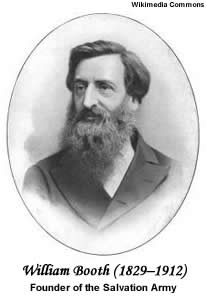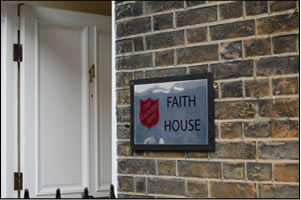I am sure that most of you will have heard of the old joke about the Salvation Army bra, “It lifts the fallen!”. Seriously though, this is the exact aim of the Salvation Army; it always has been and hopefully always will be.
The Salvation Army was born in 1878 from a name change of The Christian Mission (and previously The Christian Revival Society), founded by William Booth in 1865.Booth’s work was with the neediest of society – criminals, alcoholics and prostitutes, as well as the poor. The Salvation Army’s work continues in this way today; it is not just a church but a community service as well.

Anyone and everyone is welcome at Salvation Army church meetings but full members (or ‘soldiers’) agree to abide by certain regulations. These include no smoking, no drinking, no gambling and no use of non-prescription drugs. These rules may seem archaic in our very social society, so why does the Salvation Army continue to uphold the ‘no alcohol’ code, for example? Why can’t Salvationists have a ‘social’ drink?
In William Booth’s time, his work was originally in London’s East End where excessive drinking was the root of many problems and thus alcohol was looked on as a bad thing. Clearly, Salvation Army members could not be seen propping up bars or rolling around gutters the worse for drink, so it was considered better to have a ‘no drinking’ rule rather than a ‘drink in moderation’ one. Nobody knows until the first drink passes their lips whether or not they’re going to become an alcoholic, so it’s feasible for someone who has agreed to only drink in moderation to develop an addiction.
The Salvation Army doesn’t think any less of people who drink in moderation, but it encourages its members to realise that it is quite possible to enjoy a social situation without alcohol. Until we moved to a more rural area and became Methodists, my husband and I were full members of the Salvation Army and therefore didn’t drink alcohol because we had promised not to. Even now, about 18 years later, we only have a very occasional glass of wine with a meal and have always found that we can indeed have a great time without alcohol. We are broad-minded enough to realise that this is not the case for everyone though!

Just as in William Booth’s time, tragic situations occur nowadays where alcohol has been the cause, where people’s judgement has been compromised by drink. It wouldn’t be right for Salvationists to be two-faced; a movement which cares for those affected by alcohol cannot possibly have its members indulging to any degree.
My own sister-in-law is a Salvation Army officer and she is the manager of a drop-in centre for prostitutes in the King’s Cross area of London. Her work is very much hands-on; her very busy schedule includes regular street outreach which, for her and her colleagues, involves getting to know the ‘working ladies’ in and around the station.
They hold breakfasts and brunches at the centre, and there are shower and laundry facilities as well as ad hoc meals for anyone in need. My sister-in-law also gives support by going to court with anyone who needs her, and is one of the chaplains at Holloway Prison. Her work is now expanding to include men as well as women, and not just street workers; drug addicts, alcoholics and criminals are just as welcome at the centre.
The photograph above shows the open front door of the drop-in centre, very aptly named ‘Faith House’, as the whole reason for the Salvation Army is to show the love of Jesus Christ to others, in a practical, caring way through their faith in him. This is not always a popular topic these days, but there are people all over the world who live their lives by this very tenet.
Mandy in Wiltshire
© Mandy in Wiltshire 2008